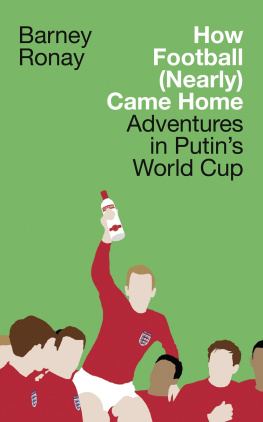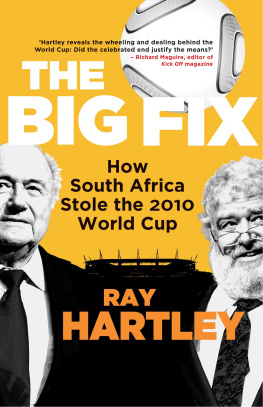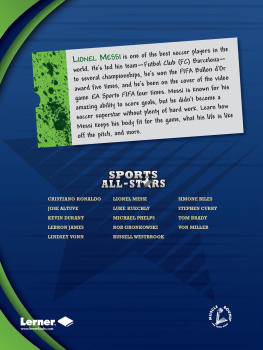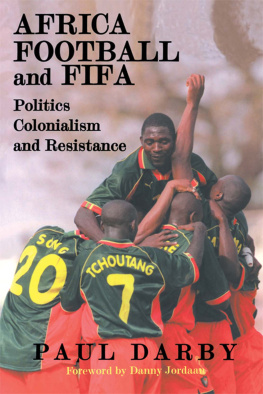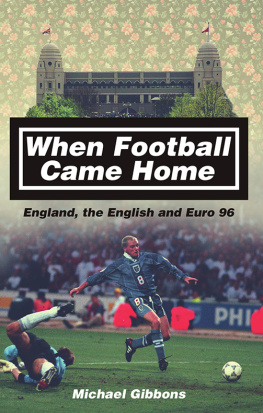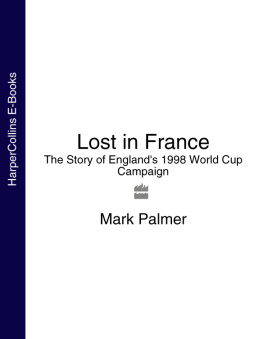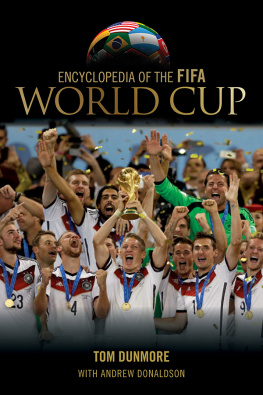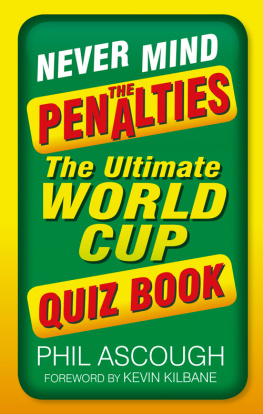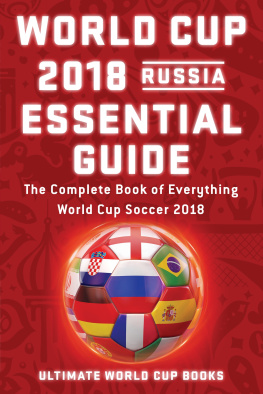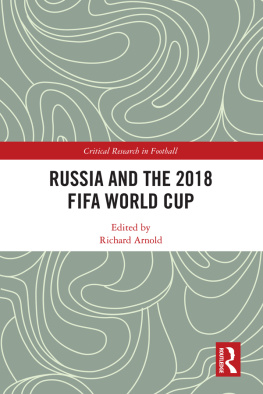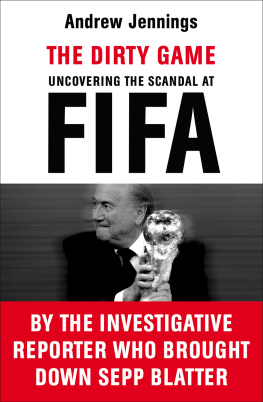
HarperCollinsPublishers
1 London Bridge Street
London SE1 9GF
www.harpercollins.co.uk
First published by HarperCollinsPublishers 2018
FIRST EDITION
Barney Ronay 2018
Cover layout design by Steve Leard HarperCollinsPublishers 2018
A catalogue record of this book is available from the British Library
Barney Ronay asserts the moral right to be identified as the author of this work
All rights reserved under International and Pan-American Copyright Conventions. By payment of the required fees, you have been granted the nonexclusive, non-transferable right to access and read the text of this e-book on screen. No part of this text may be reproduced, transmitted, downloaded, decompiled, reverse engineered, or stored in or introduced into any information storage retrieval system, in any form or by any means, whether electronic or mechanical, now known or hereinafter invented, without the express written permission of HarperCollins e-books.
Find out about HarperCollins and the environment at www.harpercollins.co.uk/green
Source ISBN: 9780008324070
Ebook Edition October 2018 ISBN: 9780008324087
Version 2018-10-22
To Kate, James, Ed and Max
Contents
7 June 2018
There were times during the endless World Cup summer of 2018 when it was impossible to escape Three Lions, or Footballs Coming Home, or whatever the song is actually called. Two days after England had beaten Sweden in the heat of Samara, as the World Cup wound down through to its endgame, a press release popped up in my inbox around 11.30 pm Moscow time, one of many that appeared every day during Russia 2018. This one was called Not Just Football and it said that a survey by something called Vanquis Bank had discovered that 86 per cent of people believed an England World Cup win could unite the country. More than half felt generally happier since the World Cup had started. Ninety per cent of people felt more proud to be British. Most unintentionally sad of all, in the middle of all this unintentional sadness, more than a quarter of pensioners said they felt less lonely because of the World Cup.
Reading this on the late-night Moscow metro, eating a packet of Russian cough sweets in lieu of dinner, after three weeks away from home chasing the World Cup around this massive country what leapt out at me was: thats a lot of lonely pensioners. Also, before the World Cup came along a lot of people seemed to feel the country was disunited. And once the World Cup was done more than half of the country would go back to being significantly more unhappy.
On the plus side, at that point it was hard to see any real end to the World Cup summer. A few days later three thousand people would gather in Hyde Park to leap and bounce and hug each other and drown in the evening sunshine as Kieran Trippier put England ahead against Croatia. A combined TV audience of 62 million people watched Englands last two matches. The motorways fell silent. The band of the Queens Guards played a brass-instrument version of Three Lions outside Buckingham Palace. Meanwhile Civil Service World magazine published an article by Sir Michael Barber comparing Englands manager Gareth Southgate, who previously played as a centre-back for Aston Villa and Crystal Palace, to JFK, Tony Blair and Clement Attlee. Gareth Southgate showed us a different way. Unfailingly polite, thoughtful, humble, self-reflective and calm and at the same time obviously passionate, iron-willed and determined, Sir Michael swooned. Online data analysts recorded that on a single day in July somebody in England tried to buy a waistcoat on average every twelve minutes.
How did we get here? Or rather, how did we get to here from there? Its time to rewind two years. Lets go back, for a moment, to the worst place.
*
The thing that really stood out in Nice, June 2016, England versus Iceland, was the way the England players faces seemed to collapse as the game wore on. Watching from close to the pitch you could see the eyes widen, the lips tremble, a look of sadness settling over the blue shirts even as they trotted through their patterns like sad, dutiful, dying horses.
Its easy to forget that England had gone 10 up against Iceland early on. Its easy to forget too how beautiful it was an hour and a half before kick-off, strolling down through the trees and the scrub by the roadside on one of those evenings where the air turns damp and warm and a little sickly-sweet as the light dies away.
There was a band of England fans across the middle of one of the stands, and as the players warmed up, a round of applause rippled down the seats like a breaking wave. The last patch of evening sun had faded away over the lip of the stand and as England kicked off everything seemed to have turned a lovely soft blue. With four minutes gone Wayne Rooney scored from the spot and England were off.
At which point, something else happened. Enter: the fear. It didnt take long. The weather can shift so quickly on these occasions, the texture of the air altered by a single misplaced pass. Ragnar Siggursson equalised after a flick from a long throw. Then Kolbeinn Sigrsson put Iceland 2-1 up with a soft shot that trickled past Joe Hart.
Watching from the press box, we knew this game was done just before half-time when Raheem Sterling picked up the ball by the touchline. The band of England fans that had cheered the players before kick-off was up on its feet now as Sterling ran past; but this time all you saw was a row of unhappy faces, pointed fingers, bunched fists, rising to their feet as he passed.
Sterling looked spooked. All the players looked spooked, with something horribly tender in their movements, their arms and legs now a little jumbled and muddled, always somehow facing the wrong way. The fans would later say this England team shat it. The pundits used words like frozen and choked. England teams have shat it before. But this was something more obvious, a real-time shatting. Defeat wasnt just coming. It was already there, rearranging the furniture, preparing its best lines, moving like a ghost among the players.
The next day Roy Hodgson appeared before the media in Chantilly. Hodgson was up there in front of the advert boards on no sleep, sweating and twitching and looking like the disgraced chancellor of a crisis-ridden central European state held hostage by invisible captors and forced at gunpoint to talk in a halting, frazzled voice about looking at the wider picture and being proud of this group of players.
It did feel different. This was not just another cyclical low. This felt like the end of something, a defeat more vicious than sport usually throws up. Nobody was saying well played, better luck next time, carry on old chaps. Back in England at the fag end of the summer the feeling of alienation was tangible, not so much a call for change any more always, always the call for change as a kind of anger, a sense of distance from players, team, manager, an absence of any connection with these sullen, failing superstars.
Hodgson was gone. Sam Allardyce came in and lasted one game, sacked in the autumn after a sting operation by the Sunday Times that revealed very little of any interest beyond the fact the England manager had sat in a restaurant drinking what appeared to be a pint of wine. In a vacuum of disinterest and distaste and to a chorus of underwhelmed bemusement, the FA appointed its Under-21s manager on a three-game trial.
*
Gareth Southgate had been at the FA for three years at the time. He was popular with journalists, but not hugely so, not the type to play the game, cultivate friends, drop stories. He was an inside man, in the chair while the FA got its head together. Those who knew Southgate best had talked about his ambition as a coach, his genuine feeling for this job. But no one had really seen it yet. Southgate wasnt the story. He was a prop, a plot device, a holding pattern.
Next page
